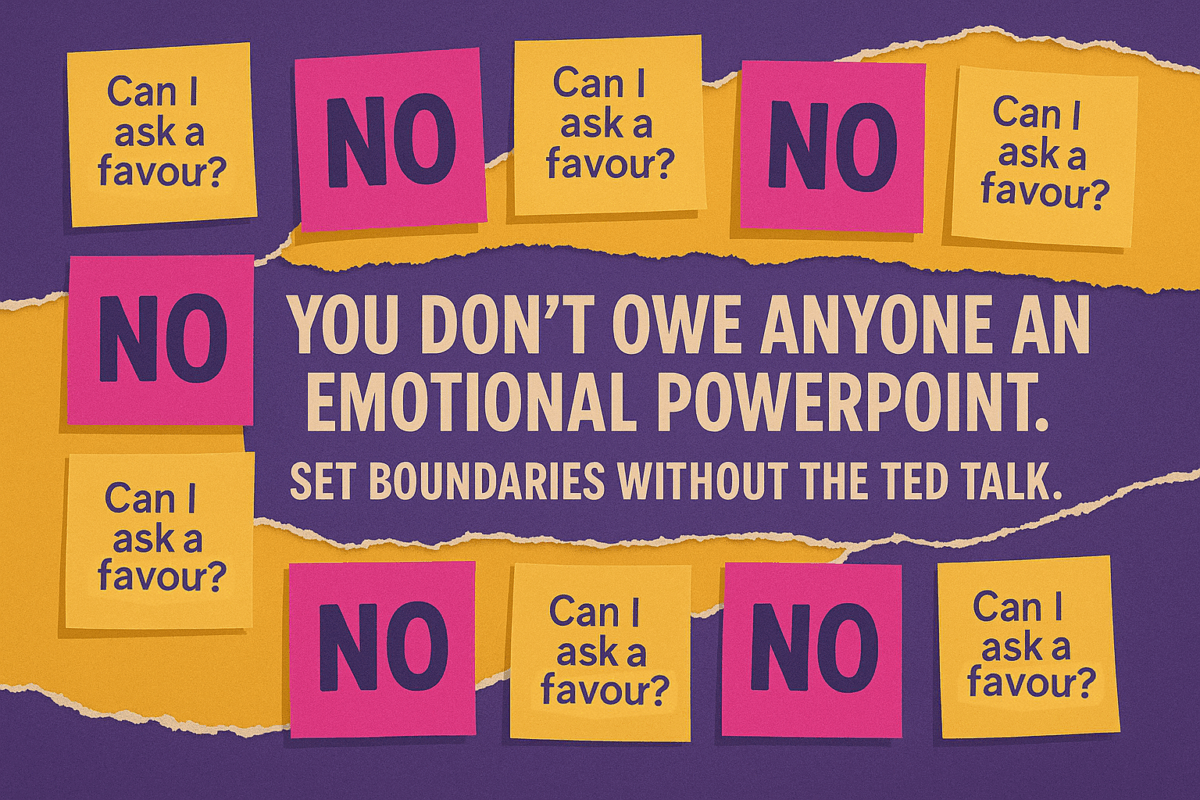
How to Set Emotional Boundaries (Without Explaining Yourself)
- Say no clearly and briefly
- Use preset phrases that protect your time and energy
- Don’t cushion your boundary to make others comfortable
- Let guilt be a signal, not a stop sign
- Boundaries reveal who respects you, and who benefits from your silence
TL;DR: What Are Emotional Boundaries (And Why Do You Need Them)?
Emotional boundaries are your internal fences, the lines that protect your energy, peace, time, and sanity. They tell others: this is what I’m okay with, and this is what I’m not.
You need them because without them, you absorb everything:
- Other people’s anxiety
- Everyone’s expectations
- Guilt that isn’t yours
- Tasks you didn’t agree to
This is how emotional exhaustion begins. It’s not just feeling tired, it’s carrying too much that doesn’t belong to you.
Why We Struggle to Set Them
If you were raised to be “nice,” praised for being helpful, or guilted into keeping the peace, setting emotional boundaries feels unnatural. Maybe even dangerous.
You’ve probably thought:
- “I don’t want to hurt their feelings.”
- “It’s just easier to do it myself.”
- “If I say no, they’ll be disappointed.”
But here’s the thing: people who love you won’t be crushed by your limits. And people who are crushed? Often benefited from you not having any.
You’re Allowed to Say No (Without a Monologue)
Boundary-setting doesn’t have to be an event. You can say “no” like it’s a complete sentence. Because it is.
Here are emotional boundary phrases that protect your energy:
- “I’m not available for that.”
- “I’m focusing on myself right now.”
- “That doesn’t work for me.”
- “I won’t be able to help with that.”
- “I need to think about it, I’ll let you know.”
You’re not rude. You’re regulated. This is how to set emotional boundaries in real life: short, clear, and without guilt.
What Happens When You Stop Explaining
When you stop justifying and cushioning every “no” with five layers of guilt, here’s what changes:
- You feel lighter
- You stop pre-spinning conflict in your head
- You get your time and energy back
- People either respect your limits, or reveal their intentions
If someone gets angry at your boundary, that’s information. Not a project. Not your problem.
Scripts for Setting Boundaries in Real Life
Need a few boundary setting scripts? Try these:
When someone asks for your time:
“I’ve got a lot on my plate right now, I need to say no.”
When someone dumps their emotions on you daily:
“I care about you, but I’m feeling really overwhelmed. I can’t hold space for this right now.”
When someone crosses a line with you:
“I’m not okay with that. Please don’t do it again.”
When you’re pressured to explain:
“I’ve made my decision. I’m not open to debating it.”
How This Ties Into Burnout Recovery
Constantly explaining yourself is emotional labor. It’s not just tiring, it’s unsustainable. Especially when you’re the “strong one.”
Healthy boundaries help you:
- Protect your nervous system
- Avoid resentment
- Prevent emotional burnout
- Keep relationships honest and balanced
This is people pleasing recovery in real time. Learning to say no without guilt is an act of self-respect. It’s also how to stop being a people pleaser without burning out.
FAQ: Emotional Boundaries Edition
It’s the internal limit that protects your mental and emotional wellbeing. It helps you know what’s yours to carry, and what’s not.
Start by recognizing that guilt doesn’t mean you’re wrong. Use short phrases, stay firm, and remind yourself: your peace matters too.
“That doesn’t work for me.” It’s simple, clear, and doesn’t invite negotiation.
Want More Help Saying No Without Guilt?
The Strong One Is Tired was written for the burnout you don’t talk about, the people-pleasing spiral, the quiet exhaustion, the inability to rest without guilt.
It’s not a boundary workbook. It’s something better: permission to drop the weight. Guilt-free.
📘 Grab The Strong One Is Tired, your burnout recovery guide for people-pleasers, emotional caretakers, and anyone too tired to keep justifying their “no.”
Grab the BookYou’re Not Lazy, You’re Burnt Out (Here’s How to Tell the Difference)
Can’t function, but feel guilty for resting? This isn’t laziness. This is burnout. Learn how to tell the difference, and start recovering.
How to Rest Without Feeling Guilty (Even If You’re Cooked)
Tired but can’t switch off? This guide shows you how to rest without guilt, even if your brain insists you should be doing more.
Why Being the Helper Is Quietly Destroying You
Being the helper feels noble, until it leaves you emotionally empty. Here’s why being the strong one is exhausting you and how to take your energy back.
How to Set Emotional Boundaries Without Explaining Yourself
You don’t need to host a TED Talk every time you protect your peace. This guide teaches you how to say no without guilt, drop the over-explaining, and reclaim your damn energy. Because your nervous system deserves better.
Why Burnout Doesn’t Look Like Burnout Anymore
You’re still functioning, but you’re also fading. This article exposes the quiet truth about emotional burnout, how it’s changed, and what modern burnout really feels like.
10 Signs You’re the Strong One in Every Room (and It’s Wrecking You)
You’re the reliable one. The rock. The unpaid therapist. But constantly carrying everyone else’s chaos comes at a cost, and it’s probably already showing up in ways you’ve been taught to ignore. This one’s for the strong-but-cooked.







